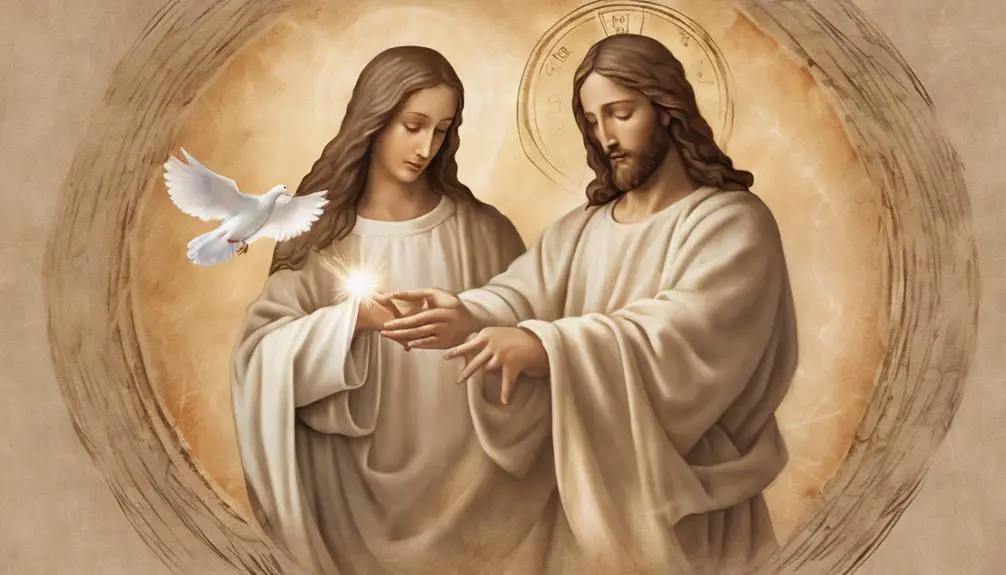How did Jesus address Mary in the Bible? Uncover the intriguing details behind their sacred relationship and its profound implications.

Did Jesus Call Mary Mother in the Bible
Imagine walking through the ancient streets of Jerusalem, hearing the voices of the past echo off the stone walls, and finding yourself pondering a question that has intrigued scholars and believers alike: Did Jesus ever call Mary 'Mother' in the Bible?
You're about to embark on a journey through scripture, cultural context, and theological implications to unearth this answer. By examining instances of direct address and interpreting Jesus' words, you'll gain insights that might challenge or affirm your understanding of their relationship.
This exploration promises to shed light on an aspect of Christian theology that continues to spark curiosity and debate.
Key Takeaways
- Jesus rarely addressed Mary directly, making each instance significant for interpretation.
- Cultural and linguistic contexts are crucial for understanding how Jesus referred to Mary.
- The Greek New Testament does not consistently use the term 'mother' for Mary in Jesus' addresses.
- Analyzing Jesus' titles and terms for Mary offers insights into their relationship and theological implications.
Analyzing Biblical Texts

In examining biblical texts, it's crucial to scrutinize the specific language and context to determine how Jesus referred to Mary. Through the lens of textual criticism, you'll find that the original languages of the Bible—Hebrew, Aramaic, and Greek—offer insights into the nuanced ways in which familial relationships were expressed. This method involves comparing various manuscripts to identify linguistic variations and understand the subtle differences in how terms of endearment or respect were used.
Textual critics highlight that in the Greek New Testament, the direct references Jesus makes to Mary don't consistently use a specific term that directly translates to 'mother' in English. Instead, the choice of words and their implications may shift, depending on factors such as the intended audience of the Gospel or the specific message being conveyed at that moment. Analyzing these linguistic variations requires a careful consideration of the historical and textual context, ensuring a more accurate interpretation of these interactions.
This analytical approach underscores the importance of not taking biblical texts at face value. By delving into the complexities of language and textual transmission, you gain a deeper understanding of the dynamics between Jesus and Mary, free from modern assumptions or oversimplifications.
Cultural Context of Terms
Understanding the cultural nuances behind the terms used in the Bible is crucial for a comprehensive analysis of how Jesus referred to Mary. The context in which words were used in ancient times, especially concerning family roles and societal norms, significantly influences their interpretation today. In the time of Jesus, family roles weren't just about biological relations but were deeply intertwined with societal duties and expectations. These roles dictated behavior, responsibilities, and even the way members addressed each other.
Societal norms of the period also played a critical role. The way individuals referred to one another could reveal their social status, their relationship, and the level of respect or intimacy between them. It's important to consider these aspects when analyzing biblical texts, as the direct translation of terms mightn't fully convey their original meaning or intent.
In this light, examining how Jesus addressed Mary without understanding the cultural and societal context risks misinterpreting the significance of their interactions. It's not just about the words used but the underlying familial and societal expectations they reflected. This analysis sets the stage for a deeper understanding of their relationship beyond the literal words recorded in the Bible.
Instances of Direct Address

Analyzing the instances where Jesus directly addresses Mary reveals nuanced insights into their relationship and societal norms. Throughout biblical narratives, the direct addresses Jesus makes to Mary are relatively scarce, yet each occurrence is loaded with significance. These moments provide a window into the dynamics of Mary's titles and familial relationships within the context of their time.
In the Gospels, Jesus refers to Mary in ways that may initially seem distant or formal to contemporary readers. This choice of address, rather than diminishing their bond, reflects the cultural and religious frameworks in which they lived. The titles and terms used by Jesus aren't merely labels but are imbued with layers of meaning, respecting social customs and religious significance of the period.
The direct addresses also illuminate the multifaceted role Mary plays—both as Jesus' mother and as a figure within the early Christian community. Understanding these instances within their historical and cultural backdrop allows for a deeper appreciation of the complexities of familial relationships and Mary's unique position in the narrative.
This analysis underscores the importance of context when interpreting these interactions, avoiding superficial readings and acknowledging the depth of their relationship.
Interpreting Jesus' Words
Delving into Jesus' words requires careful consideration of the cultural, religious, and linguistic contexts that shape their meaning and our interpretation. To fully grasp Jesus' perspective, you need to recognize the depth and nuances in his language and how they reflect his relationship with Mary and his broader teachings.
Here are essential aspects to consider:
- Cultural Context: The way Jesus addressed Mary must be seen through the lens of 1st-century Judean society. This context influences how familial relationships and respect were expressed.
- Religious Significance: Understanding Jesus' words also involves exploring their spiritual implications, considering the Jewish traditions and prophecies prevalent at the time.
- Linguistic Variations: The original words of Jesus have been translated through multiple languages. Each translation can introduce subtle shifts in meaning, making it crucial to study these linguistic variations.
- Historical Interpretations: Scholars have debated the implications of Jesus' addresses to Mary for centuries. Their analyses provide valuable insights into how these words have been understood over time.
Impact on Christian Theology

Examining how Jesus addressed Mary notably influences Christian theological interpretations, shedding light on the nature of their relationship and its broader implications for doctrine. The manner in which Jesus refers to his mother can offer insights into his divine humanity and the salvation implications therein.
Aspect of Theology |
Implications |
|---|---|
Divine Humanity |
Highlights Jesus' dual nature as both divine and human, emphasizing his relatable human experiences. |
Role of Mary |
Elevates Mary's position as the Theotokos, reflecting on her essential role in the mystery of the Incarnation. |
Salvation History |
Underscores the importance of Mary's consent in the divine plan of salvation, illustrating human cooperation with divine grace. |
Ecclesiology |
Suggests a model for the Church's maternal role in nurturing believers toward spiritual maturity. |
Christological Titles |
Affects the nuanced understanding of titles attributed to Jesus, balancing his messianic mission with his familial ties. |
In this context, the way Jesus interacts with Mary not only deepens the comprehension of his divine humanity but also enriches the understanding of salvation implications. The analysis encourages a nuanced view of biblical narratives, urging believers to consider the complex interplay between divine providence and human agency in the economy of salvation.
Frequently Asked Questions
How Have Different Christian Denominations Historically Interpreted the Relationship Between Jesus and Mary, Beyond the Biblical Texts?
Different Christian denominations have interpreted Jesus and Mary's relationship beyond the biblical texts through varying lenses.
You'll find Marian apparitions have played a significant role, where reported visions of Mary have influenced beliefs and practices.
Additionally, doctrinal disputes have shaped understandings, with some denominations emphasizing Mary's role in salvation history more than others.
This diversity reflects the complex nature of interpreting religious figures and their relationships within Christianity.
What Are the Psychological Theories Behind Why Jesus Might Have Chosen Specific Terms to Address or Refer to Mary, According to Modern Psychology?
You're on the edge of uncovering why certain words hold power. Diving into modern psychology, Attachment Theory suggests that the choice of terms reflects deep emotional bonds.
Linguistic Relativity goes further, proposing that these words shape our reality. Analyzing this, you find a scholarly path that dissects the psychological underpinnings behind word choices, revealing how they mirror complex relationships and influence perceptions, without directly stating their biblical origin.
How Has the Depiction of Mary's Motherhood Evolved in Christian Art and Literature Outside of the Biblical Narrative?
In exploring the evolution of Mary's motherhood in Christian art and literature, you'll find that both iconography and literary portrayals have significantly evolved. Initially, depictions focused on her divine aspects, but over time, there's been a marked shift towards highlighting her humanity and maternal qualities.
This transition in narrative and visual representation reflects broader theological and cultural shifts, underscoring how Mary's image adapts to societal changes and religious interpretations.
What Role Does Mary's Motherhood Play in Contemporary Christian Practices and Rituals That Aren't Directly Derived From the Bible?
In contemporary Christian practices, Mary's motherhood significantly influences rituals not directly sourced from the Bible. You'll find Marian devotions deeply embedded, with believers often participating in prayers and dedications to honor her role.
Feast days, like the Annunciation and Assumption, underscore her importance within the faith, drawing communities together in celebration and reverence.
These practices and rituals reflect a profound respect for Mary, underscoring her enduring impact on Christian spirituality.
Are There Any Significant Archaeological Findings That Have Influenced the Understanding of Mary's Role as Jesus' Mother, Not Covered in the Biblical or Theological Interpretations?
You're exploring if archaeological discoveries, like Mary's tomb or genealogical records, have reshaped the understanding of Mary as Jesus' mother, beyond biblical or theological interpretations.
While significant findings might offer insights into Mary's historical context or lineage, they haven't drastically altered her perceived role.
Such evidence primarily enriches background knowledge rather than redefining her motherhood in Christian doctrine, which remains deeply rooted in scriptural and theological foundations.
Conclusion
In meticulously mapping the moments Mary is mentioned, one notices nuances in nomenclature. Jesus' choice of words when addressing or referring to Mary doesn't directly dub her 'mother' in the canonical Gospels. This linguistic layering, laden with theological implications, invites an intricate interpretation.
Such scholarly scrutiny shows a subtle shift in societal and spiritual standings. Hence, harmonizing historical texts with theological thought threads through a tapestry of tradition, teasing out tensions and textures in the timeless text.



Sign up